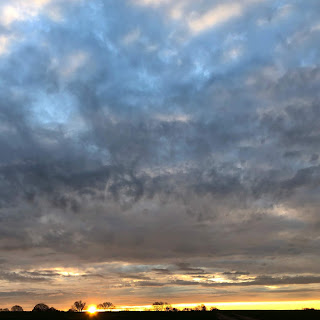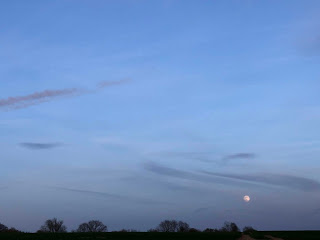Constants - those rooting things that never change. Those things that we depend upon. That ground us firmly in who and where we are. The things that if removed would be replaced by chaos.
When I was thinking about what to write, I clumsily started to input c-o-n- into my phone and up popped the suggestion 'consonants.'
Consonant - definition: any speech sound that is produced by stopping the air flowing freely through your mouth - 'f', 't', 'z', 'm' ... etc, and also any written letter that is not a vowel.
By substituting the t in constant with the on in consonant my phone unwittingly suggested something that at first glance might appear to be constant but is not. Language evolves and changes - even its letters; its building bricks. Not all of the vowels and consonants we take for granted today are the same as the ones known, for example, by Shakespeare. If we go further back in the history of the English language, to Chaucer, they are different still and almost unrecognisable - paleys (palace); lyche (like); hir (their); and my favourite, sodeynly (suddenly).
In 1476, the many different and coexistent dialects; words borrowed through invasion and trade from multiple languages; a dominance of Latin among scholars, churches and merchants; and no consensus at all, in how to spell, led to a logistical headache for William Caxton, when he brought Gutenberg's printing techniques to England and started his own printing press. Apparently, there was no european type-set available for the commonly used sound made at the beginning of 'the', so Caxton substituted a 'y'. We all recognise 'ye' as 'the' because our villages are filled with 'Ye Olde' bakeries and tea rooms and public houses. But every time we say 'yee' we should of course be saying 'the'!
Another obvious difference in the English of the past was the use of 'f ' where we now use an 's' in the middle of words, as in perfon and eafily and Shakefpeare. Look at the first three lines of the original folio for 'The Tragedie of Hamlet Prince of Denmarke' - it's very different (... centuries different) from our modern use of consonants -
Bar. Whofe there?
Fran. Nay anfwere me. Stand and vnfolde yourfelfe.
Bar. Long liue the King.
... note the f for s; e at the end of words where we no longer need an e; and a muddle of u and v substitutions. Memorably, the f and s switch is still seen in some old Bibles and led Alice Tinker, of Vicar of Dibley fame, to stumble through a reading, 'Ye are the falt of the earth and fainted. God shall feal your endeavours until ye fit on his right hand. Therefore fight the good fight, for his ... fake, and he shall be thy fu...' (succour!)I said at the beginning that constants are those things that if removed would be replaced by chaos -
I'm about to contradict myself. Forget what I said about language evolving and not being constant and instead, think of the building bricks we use today. Could we manage without them? What would happen if they were removed?
Take vowels first -
'wth th vwls mssng t's nt hrd t mke sns nd smtms t frcs y t lk hrdr t th wrds' (= with the vowels missing it's not hard to make sense and sometimes it forces you to look harder at the words)
So, when the vowels are dropped, there is no descent into complete linguistic chaos.
But what happens when the consonants are removed -
: 'i'_ _o_e _ou _e__ _ui____' (I'd lose you very quickly).
I have somehow managed to argue that the place of consonants in language is both inconstant and constant. A circuitous procrasti-ramble triggered by a simple texting mistake on my phone. But one that nudged me into a very pleasant hour reading Chaucer and discovering that Shakespeare or Shakespere or Shakespear or Shakspere or Shake-speare couldn't spell.
Back briefly to constants and specifically, sunrises
- on Saturday
on Sunday
and today
See @herbiecax on Instagram for their accompanying quotes. But this quote - from Louis MacNeice -applies to all sunrises
The sunlight on the garden
Hardens and glows cold
We cannot cage the minute
Within its net of gold
We cannot cage the minute but we can witness sunlight every day. The sun is the recurring constant; the big one. It and the moon never change.
If we ground ourselves in this - pause for a moment; breathe - if we anchor ourselves on the constants, like the sun that will always rise, the world no longer appears so out of control.
All the constants have not been removed and what looks like chaos, is not.
Tonight, in the chilly air and evening sunlight, I waited with these friends for the moon ... all they wanted was the bread in my hand
... but, it was worth it, and 'I saw the whole of the moon'





Comments
Post a Comment